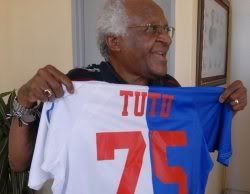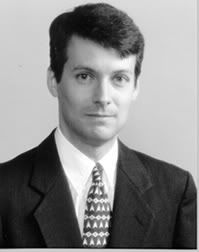Every now and then I experience these moments where I sense that things really *are* right with the world, and unfolding in a positive direction--even though much of what we see and experience seems to suggest otherwise. Of course, I am fully aware that what I perceive as "God's clues", while they are meaningful to me personally, can easily be explained as ordinary coincidences. But I am thankful when the Universe provides them. O Lord my God, when I in awesome wonder, Again, I know this isn't the stuff of miracles to most people, but for me that moment combined a sense of hope for the future and connectedness to the past--and reassurance that my beloved spiritual role model is still with me today. Alternate link for comments |
Saturday, September 30, 2006
Moments of "rightness"
Posted by
Renee in Ohio
at
9:11 PM
|
![]()
Friday, September 29, 2006
Desmond Tutu: "Rabble Rouser for Peace"
Crossposted at Street Prophets, My Left Wing, Booman Tribune, and Daily Kos
How I would love to find a picture of Desmond Tutu dancing. I think that would make a lot of people smile. And, as I mentioned, there are many of us who could use a renewed sense of hope and joy right about now. I, for one, could use a pep-talk from the likes of Desmond Tutu. So I went searching for some words of wisdom from him. In the process of doing that, I learned that he is turning 75 on October 7.  And that there is a biography of Desmond Tutu scheduled for release at that time: Rabble-Rouser for Peace: The Authorized Biography of Desmond Tutu. It is discussed in this article at Beliefnet: In the book, Tutu is candid about his gradual acknowledgment "that sexual orientation, like race or gender, was a given," Allen writes. I also learned that he's going to be a Distinguished Lecturer in Residence at the Semester at Sea in spring 2007. Read the article--it sounds very cool. I would love to be able to experience something like that. To be able to meet Desmond Tutu in person and learn from him. Right now, though, I struggle to imagine what I could say to him, when I think of the way my country is continuing to disgrace itself. All I can think of is "I'm sorry. I'm so sorry." And I'd want to say to him--although he *must* be aware of this--that there are many good people trying very hard to move this country in a better direction. It's just that a lot of them are feeling really tired right now. But we're not giving up. Alternate link for comments |
Posted by
Renee in Ohio
at
12:23 PM
|
![]()
Saturday, September 16, 2006
Defending Church-State Separation: National speaker comes to Columbus
I posted about this a while ago, but since the event is tomorrow, I thought a timely reminder was in order... Sunday, September 17, 2006 3:00 P.M. North Congregational UCC 2040 W. Henderson Rd. Columbus, OH 43220 Rob Boston (assistant director of communications for Americans United for Separation of Church and State) will be speaking on speaking on "Defending the Separation of Church and State in Difficult Times" Click here for more details. You can read more about Rob Boston here. Rob Boston's book, The Most Dangerous Man in America?: Pat Robertson and the Rise of the Christian Coalition is available at Powells.com, Amazon.com  , and Barnes & Noble.com. , and Barnes & Noble.com.Alternate link for comments |
Posted by
Renee in Ohio
at
3:37 PM
|
![]()
Monday, September 11, 2006
The Challenge of Terror
I thought this might be a good time to excerpt and link The Challenge of Terror, written by John Paul Lederach in the days that immediately followed September 11, 2001. Lederach is a Professor of International Peacebuilding at the University of Notre Dame. Clearly, the U.S. government didn't heed his advice when responding to the events of 9/11/01, but I still think the essay is worth reading. And, since the media is busily revisiting everything else about that tragic day, I can't think of any reason *not* to revisit these thoughtful words.  Military action to destroy terror, particularly as it affects already vulnerable civilian populations will be like hitting a fully mature dandelion with a golf club: This will further perpetuate the myth of "evil United States military might" and will assure yet another generation of recruits. Alternate link for comments |
Posted by
Renee in Ohio
at
12:35 PM
|
![]()
Sunday, September 10, 2006
Faithful Democrats
I'm aware of not having posted much lately on this blog--haven't had a whole lot to say, or time to compose my thoughts. Most of my efforts have gone into trying to generate some income for our household. Getting kids settled back into school, and Daughter in Ohio's birthday the other day. My "baby" is now 11 years old. Kids are good for reminding you just how fast time goes by. For me, the goal is not to be a liberal Democrat or a conservative Democrat. For me, the goal is to be a Golden Rule Democrat. Click here for the rest. Last month, I took part in a blogger conference call with Ted Strickland. It is transcribed in three parts: Part 1 Part 2 Part 3 Alternate link for comments |
Posted by
Renee in Ohio
at
3:56 PM
|
![]()
Sunday, September 03, 2006
Bumper stickers
Thought I'd try my hand at a few myself. I've seen plenty of them that say "Jesus was a liberal", and I wanted to do something a little different, so I went with this... |
Posted by
Renee in Ohio
at
10:30 PM
|
![]()
The Gospel of God's Unconditional Love
Last Sunday, at Howard-Empowered People, Oscar in Louisville's Word for the Week was entitled "What, in Hell, Do You Want?" There was a note at the beginning of the post, indicating that it was the message he would be preaching at Temple of Faith Baptist Church that day. That same day, sitting in Saint Stephen's Episcopal Church, I heard a very different sermon. What fascinated me, upon coming home from church and seeing Oscar's post, was that *both* sermons featured Carlton Pearson--a man whose name I had never heard before that day--as a major character. Today at church, I picked up a copy of Rev. George Glazier's sermon from August 27, and I would like to share it here. There is the Gospel of God's conditional love which says that God's love only becomes operative as a relationship of acceptance and inimacy after the believer has fulfilled certain conditions.You can hear that conditional love in Solomon's prayer at the dedication of the temple. God will faithfully make sure that a successor will sit on the throne of David if only the children of Israel walk before God as Solomon has. The Gospel is one of if, then. Young continues: This Gospel of God's Conditional Love gives rise to the contradiction at the heart of church practice: the Church says that God's love is unconditional (the concept of grace) and yet it constantly sets up conditions for acceptance within its fold. Young goes on to point out that this gospel is not good news nor is it really new. He links it to the kind of legalism that Jesus opposed in some of the Pharisees. Against this is what Young called the Gospel of God's Unconditional Love (what I have been calling grace for the last few weeks.) This unconditional love of God is laid out in parables like the Prodigal son and the Lost Sheep. It is on display in Jesus' attitudes toward the social and religious outcasts of his day. The implication of Jesus' behavior is that God loves us unconditionally and accepts us prior to any response that we may make to God's love. Jesus intiative somehow frees people to respond. The response [we may make] is not the condition of acceptance but the sign that the gift of God's grace has been accepted. Which gospel would you choose? It seems like a no brainer...but the answer for most Christians is the first one - the Gospel of God''s Conditional Love. If you don't believe me, ask Carlton Pearson. Carlton Pearson started preaching before he was ten years old. When he went to college, there was no doubt that he would be a preacher. At Oral Roberts University, he was a star. As he was profiled on 60 Minutes a few weeks ago, there was Carlton, the lone African American standing in a line of students on the stage with the man who would become his mentor, Oral Roberts. Carlton succeeded beyond his wildest dreams. He started a church, became a bishop, grew the church in Oklahoma City to where it had thousands and thousands of members. And then one day he was watching a news story about Muslim refugees in Africa fleeing from some war torn part of the continent. His heart was moved, but at the same time he realized he had been taught that as Muslims, as non-believers in Jesus, these people were destined for hell. He remembered his own grandfather and grandmother who had left the church and were called "backsliders". He began to contemplate this God of Conditional Love. I am sure he prayed and searched the Bible and his mind and heart changed. He then began preaching about God's Unconditional Love in his large congregation. What happened? Like the crowd in today's gospel, the congregation found it too much to stomach. This teaching is difficult, who can accept it? ...Many of his disciples turned back and no longer went about with him.Bishop Carlton Pearson watched his flock dwindle to a few hundred and then a few dozen. The church building was sold. His mentor, Oral Roberts, turned his back on him for preaching such an inclusive gospel. His fellow evangelicals gried to get him to come to his senses. But an old established church in Oklahoma City, in the midst of downtown, invited him to start a new congregation on Sunday afternoons. Can you guess what kind of church did that, what denomination? You guessed it - the Episcopal Church. Despite all the setbacks, all the loss and the grief, Carlton Pearson still believes in the Gospel of God's Unconditional Love because these are the words of eternal life. The Episcopal Church continues to be powered by the Gospel of God's Unconditional Love. It is not a new concept - Paul, Augustine, Martin Luther and many others have embraced it. Yet our church since the General Convention of 2003 has been engaged in a struggle along these lines. You don't sense that struggle here on Sunday mornings because by some gift of the Spirit this church has always been pretty much steeped in the grace of God. In fact, it is hard for us to understand the other gospel as it is hard to understand why so many people are attracted to it. But if these two gospels are the fault lines of the church, if God's grace is really the mystery revealed in Jesus, if Jesus, as I said last week, is our grace bread, if the Real Presence of Jesus is somehow communicated in this sacrament of bread and wine and we are going to keep sharing it with everyone who comes to the table, when will this Gospel of God's Unconditional Love be a success? This is where I am supposed to tell you that someday in the future this gospel will triumph and Christianity will shine clearly in the sun, a beacon to all people, a friend to all religions. In two thousand years it has not happened. Yet perhaps the problem is with the question and particularly with the word success. I am not sure it is a word that many of the Christian saints - Francis, Dorothy Day, C.S. Lewis or Mother Teresa would understand. None would have considered themselves successful, but their lives of faith brought such grace and love into the world that we would probably describe them as successful because success is important to us. They would probably speak of persevering or enduring or being faithful. And that is what the Gospel of God's Unconditional Love, God's grace, has done in the church for two thousand years - it has persevered, endured, and been faithful to the truth about God as revealed in Jesus. And we are here as its witnesses. What shall we be? Well, that is for God to reveal. But I am reminded of the face of Carlton Pearson preaching to his diminished congregation in that Episcopal Church. Nothing about his face looked diminished. In fact, as he told it, he had never been happier. Alternate link for comments |
Posted by
Renee in Ohio
at
3:05 PM
|
![]()





